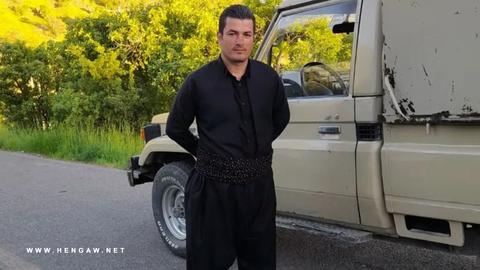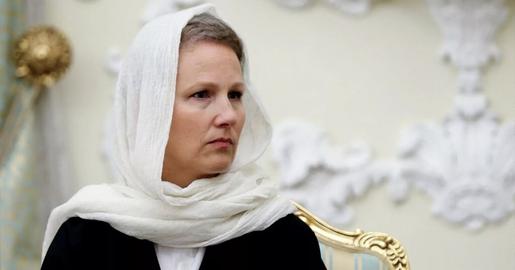Faezeh Hashemi, a political activist and daughter of late President Akbar Hashemi Rafsanjani, was arrested on September 27, 2022, early after the start of nationwide protests sparked by the death of Mahsa Amini in police custody.
Hashemi was sentenced to five years in prison on charges of “propaganda against the regime” and “disturbing public order and peace by participating in illegal gatherings.”
Last week, the authorities at Tehran’s Evin Prison barred Hashemi and four fellow inmates — Mahvash Sabit, Fariba Kamalabadi, Narges Mohammadi and Golrokh Iraei — from their right to make phone calls for a whole month.
Hashemi’s lawyer, Mohammad Hossein Aghassi, has suggested that the restrictive measure was imposed in retribution for the inmates’ participation in last month’s virtual panel discussion "Dialogue to Save Iran,” which was organized by a group of Iranian journalists and university professors.
IranWire has received a letter dated May 13 that Hashemi wrote from prison and addressed to Ali Khamenei, in which she harshly criticizes the supreme leader’s rejection of popular referendums despite widespread popular discontent toward the Islamic Republic.
The following is the complete text of Hashemi's letter to Khamenei:
A chat with Khamenei - referendum yes or no?
I, Faezeh Hashemi, currently residing in the women's ward of Evin prison, feel compelled to address Your Excellency regarding your statements made on April 17 in the presence of a group of students.
The content of your speech regarding the referendum has deeply affected me as it reflects a negation of democratic principles enshrined in the Constitution and raises concerns.
Over the years, we have witnessed the widespread and systematic violation of Iranian citizens' rights by the government, contradicting the rhetoric put forth. However, this time, your words seemed to express an unsettling heresy, devoid of the usual facade, as if they reluctantly revealed the sentiments that have been harbored in your heart for a considerable time.
In order to highlight the magnitude of this disaster, I would like to analyze your statements sentence by sentence, using historical evidence to provide a comprehensive response to each of them.
1. Can all the various issues of the country be put to a referendum?
Answer - According to Article 59 of the Constitution, public votes and referendums can be called to address significant issues. Furthermore, the issuance of a referendum decree falls under the duties assigned to Your Excellency, as outlined in the third paragraph of Article 110.
2. Which countries in the world practice such a system?
Answer - To provide a few recent examples of countries that have conducted referendums, we can mention England in 2014 and 2016, Switzerland, which holds referendums approximately four times a year on average, Australia in 1999, Italy in 2016, Denmark in 2015, Canada in 1995, Spain in 2017 and Sweden in 2013. Comprehensive information regarding all referendums held worldwide can be obtained by conducting a brief search on the internet.
3. Are all individuals participating in a referendum capable of thoroughly analyzing the issue at hand?
Answer - A) How is it that Palestinians possess the power and capacity to analyze and choose their preferred form of government, based on your proposal, while the people of Iran do not have the same opportunity?
B) Does this statement insult those who actively participated in the revolution, the referendum on the establishment of the "Islamic Republic," events like the revolution anniversary, elections, Quds days, funerals, Friday prayers, December 30 [rallies] and other governmental gatherings?
Doesn't this disregard the entirety of the Iranian population, which you have always proclaimed as being the foundation of the government? It appears that those who align with your views are given the ability to analyze, while those who disagree are labeled as unable to analyze, traitors or foreign mercenaries. Is this policy reflective of a unified approach or one that showcases multiple contradictory stances?
4. This is what the people are saying, specifically regarding the election of the president and members of parliament.
Answer - Has the concentration of absolute power and discretionary oversight genuinely allowed for the freedom to vote (the right to choose freely) and to run for office? Does the 35-percent (optimistically speaking) participation rate in the recent presidential election truly represent the voices of all citizens?
If you believe in respecting the people's choice, why have most presidents struggled to meet the minimum demands of the electorate while operating under the influence of opinions, appointments, the establishment of parallel institutions, and occasionally receiving tasks directly from Your Excellency and your peers?
The people express one sentiment, while you convey another. If this is truly the sentiment of the people, why do you express concerns about holding a referendum?
5. One of the pitfalls to avoid is haste; actions should not be taken hastily.
Are the passage of 44 years and the emergence of multiple generations with diverse opinions and demands considered as haste? Isn't it a more concerning calamity, as it implies stagnation, disregard for public demands, and a failure to adapt to the changing times?
Wouldn't a referendum align with the essence of Mr. Khomeini's statement, "What right did our fathers have to decide for us?"
6. Emigration, the exodus of elites, capital flight, feelings of despair, expulsions, deprivation, convictions, prisons, prosecutions, repression, and executions, along with the challenges of poverty, unemployment, corruption, addiction, prostitution, destruction of both material and spiritual resources, social and managerial crises, polarizations, and disregard for national interests and people's rights — how imperative does it become to prioritize a referendum on significant and foundational matters that determine the fate of the country and its people? Moreover, should the preservation of an ineffective and incompetent government take precedence over basic human and legal principles?
7. In conclusion, I would like to draw upon your own literary works to pose this question: Doesn’t a policy that violates unquestionable legal principles and the fundamental, self-evident rights of the people, while simultaneously demeaning and disregarding them, align with ignorance, betrayal and hostility?
visit the accountability section
In this section of Iran Wire, you can contact the officials and launch your campaign for various problems


























comments